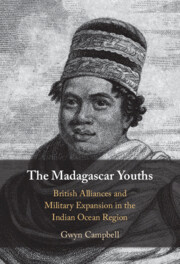Refine search
Actions for selected content:
50 results
Chapter 3 - Body
-
- Book:
- The Indian Ocean and the Historical Imagination in Afro-Asian Fiction
- Published online:
- 19 December 2025
- Print publication:
- 31 January 2026, pp 94-128
-
- Chapter
- Export citation
Chapter 4 - Place
-
- Book:
- The Indian Ocean and the Historical Imagination in Afro-Asian Fiction
- Published online:
- 19 December 2025
- Print publication:
- 31 January 2026, pp 129-164
-
- Chapter
- Export citation
15 - Mauritius
-
- Book:
- James Meade
- Print publication:
- 31 January 2026, pp 561-579
-
- Chapter
- Export citation
Chapter 5 - Sea
-
- Book:
- The Indian Ocean and the Historical Imagination in Afro-Asian Fiction
- Published online:
- 19 December 2025
- Print publication:
- 31 January 2026, pp 165-206
-
- Chapter
- Export citation

The Indian Ocean and the Historical Imagination in Afro-Asian Fiction
-
- Published online:
- 19 December 2025
- Print publication:
- 31 January 2026
The Deceptive Allure of Luxury Tourism: The Political Economy of Tourism Strategies in Mauritius, Botswana, and Rwanda
-
- Journal:
- African Studies Review , First View
- Published online by Cambridge University Press:
- 13 October 2025, pp. 1-26
-
- Article
-
- You have access
- Open access
- HTML
- Export citation
Estimated costs and benefits of participation in an extreme ritual in Mauritius
-
- Journal:
- Evolutionary Human Sciences / Volume 7 / 2025
- Published online by Cambridge University Press:
- 22 August 2025, e29
-
- Article
-
- You have access
- Open access
- HTML
- Export citation
2 - Haunted Houses
-
- Book:
- Itinerant Belonging
- Published online:
- 10 April 2025
- Print publication:
- 17 April 2025, pp 75-115
-
- Chapter
- Export citation
5 - “Man, in His Natural State … Must Either Be Led by Conviction, or by Force”
-
- Book:
- The Overseer State
- Published online:
- 21 March 2025
- Print publication:
- 27 March 2025, pp 184-236
-
- Chapter
- Export citation
4 - “A System Entirely Favorable to the Poorer Class of Natives”
-
- Book:
- The Overseer State
- Published online:
- 21 March 2025
- Print publication:
- 27 March 2025, pp 148-183
-
- Chapter
- Export citation
3 - “A Most Imperfect Act of Abolition”
-
- Book:
- The Overseer State
- Published online:
- 21 March 2025
- Print publication:
- 27 March 2025, pp 107-147
-
- Chapter
- Export citation
2 - “To Go and Look for Law”
-
- Book:
- The Overseer State
- Published online:
- 21 March 2025
- Print publication:
- 27 March 2025, pp 69-106
-
- Chapter
- Export citation
15 - The Right to Freedom of Thought in Mauritius
- from Part IV - Africa
-
-
- Book:
- The Cambridge Handbook of the Right to Freedom of Thought
- Published online:
- 06 March 2025
- Print publication:
- 13 March 2025, pp 189-199
-
- Chapter
- Export citation
The first recorded outbreak of epidemic dropsy, 1877–80: Climate, empire, and colonial medical science between India, Bengal, and Mauritius
-
- Journal:
- Medical History / Volume 68 / Issue 4 / October 2024
- Published online by Cambridge University Press:
- 13 September 2024, pp. 436-456
-
- Article
-
- You have access
- Open access
- HTML
- Export citation
14 - Emigration, Displacement, and Forced Migration in Indian Ocean Africa
- from Part V - Migration by Sea
-
-
- Book:
- The Cambridge History of Global Migrations
- Published online:
- 12 May 2023
- Print publication:
- 01 June 2023, pp 277-296
-
- Chapter
- Export citation
The impact of COVID-19 on labour markets and living standards in Mauritius
-
- Journal:
- The Economic and Labour Relations Review / Volume 33 / Issue 4 / December 2022
- Published online by Cambridge University Press:
- 01 January 2023, pp. 806-828
-
- Article
- Export citation
22 - Slow and Steady Wins the Race: Using Non-native Tortoises to Rewild Islands off Mauritius
- from Part IV - Case Studies
-
-
- Book:
- Conservation Translocations
- Published online:
- 07 December 2022
- Print publication:
- 22 December 2022, pp 469-475
-
- Chapter
- Export citation
Chapter 10 - Slavery and Indenture in the Literatures of the Indian Ocean World
- from Part III - Legacies and Afterlives
-
-
- Book:
- The Cambridge Companion to Global Literature and Slavery
- Published online:
- 15 December 2022
- Print publication:
- 22 December 2022, pp 164-184
-
- Chapter
- Export citation
3 - Mauritius
-
- Book:
- The Madagascar Youths
- Published online:
- 16 June 2022
- Print publication:
- 30 June 2022, pp 77-108
-
- Chapter
- Export citation

The Madagascar Youths
- British Alliances and Military Expansion in the Indian Ocean Region
-
- Published online:
- 16 June 2022
- Print publication:
- 30 June 2022
